Fukuoka stands as a testament to Japan’s intricate tapestry of history and culture, seamlessly blending over two millennia of trading traditions with contemporary allure. Its streets echo with tales of ancient influences from China and Korea, while vibrant festivals like Hakata Gion Yamakasa breathe life into its rich heritage. Culinary delights, from the beloved tonkotsu ramen to savory yakitori, tantalize the palate, inviting exploration. As one wanders through historical landmarks like Shofukuji Temple, a sense of tranquility envelops the bustling city. Yet, what truly makes Fukuoka an essential destination remains to be uncovered.
- Good To Know
- Overview of Fukuoka’s History
- Cultural Significance of Fukuoka
- Must-Visit Historical Sites
- Local Festivals and Traditions
- Culinary Delights in Fukuoka
- Shopping and Entertainment Areas
- Scenic Spots and Nature
- Tips for Exploring Fukuoka
- Frequently Asked Questions
- What Is the Best Time to Visit Fukuoka?
- How Do I Navigate Public Transportation in Fukuoka?
- Are There Any Language Barriers in Fukuoka?
- What Are the Local Customs I Should Be Aware Of?
- Where Can I Find English-Speaking Guides in Fukuoka?
- The Sum Up
- More Historical Tours in Fukuoka
- More Tour Reviews in Fukuoka
- Looking for something different? Other Fukuoka activities we've written about
Good To Know
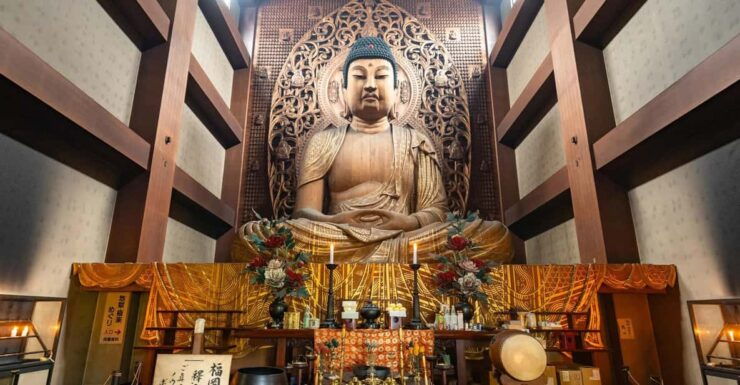
- Fukuoka, located on Kyushu’s northern shore, has a rich history as a vital port for trade with Asia for over 2,000 years.
- The city showcases a vibrant cultural scene, highlighted by festivals like Hakata Gion Yamakasa and traditional crafts that preserve local identity.
- Culinary delights such as Tonkotsu ramen and fresh seafood reflect Fukuoka’s diverse cultural influences and coastal heritage.
- Must-visit historical sites include Shofukuji Temple and Kushida Jinja, which embody the city’s Zen Buddhist roots and community spirit.
- Scenic spots like Ohori Park and Shikanoshima Island offer natural beauty, perfect for relaxation and outdoor activities year-round.
Overview of Fukuoka’s History
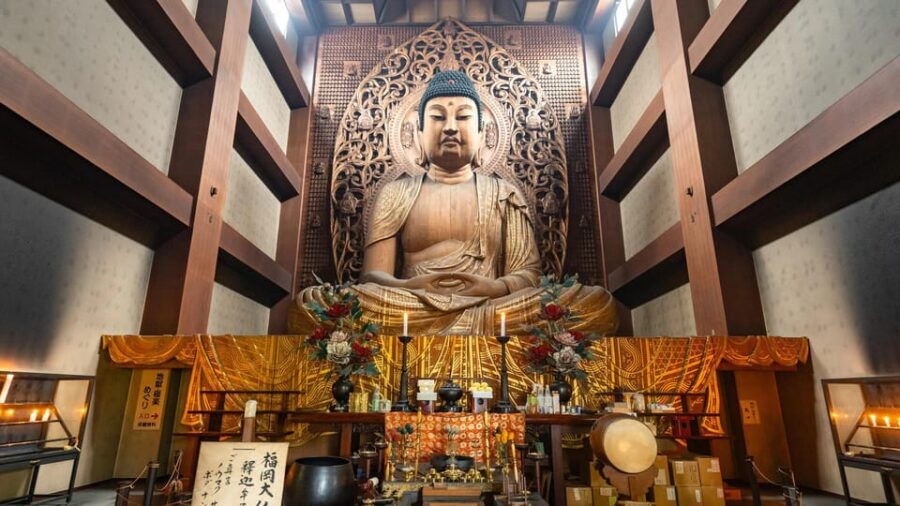
Fukuoka, a vibrant city on the northern shore of Kyushu, boasts a rich tapestry of history that dates back over 2,000 years.
Initially, it served as a vital port, facilitating trade between Japan and the Asian continent. Throughout centuries, it evolved into a cultural hub, showcasing influences from China and Korea.
The city played a crucial role during the Edo period, becoming a center for commerce and the arts. Notably, Fukuoka’s historical landmarks, like the ancient Shofukuji Temple, reflect its Zen Buddhist roots.
The city’s heritage is preserved in its festivals, culinary traditions, and architecture, making it a living testament to Japan’s past. Visitors can sense the remnants of this vibrant history in every corner of Fukuoka.
Interested in history? More Fukuoka historical sites we've covered
Cultural Significance of Fukuoka
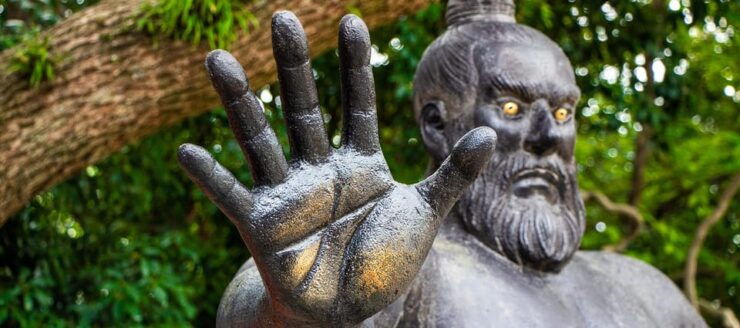
Rich in history, Fukuoka is more than just a city; it’s a vibrant cultural landscape where traditions and modern life intertwine seamlessly. The local festivals, traditional crafts, and culinary delights reflect the city’s identity, making it a fascinating destination for cultural enthusiasts.
| Element | Significance |
|---|---|
| Festivals | Celebrate community and heritage |
| Traditional Crafts | Showcase local artisanship and skills |
| Cuisine | Represents diverse cultural influences |
Fukuoka’s annual Hakata Gion Yamakasa festival, for instance, exemplifies the city’s spirited community engagement. Its unique culinary scene, particularly the renowned Hakata ramen, draws food lovers from afar. Together, these elements create a rich tapestry that embodies Fukuoka’s cultural significance.
Must-Visit Historical Sites
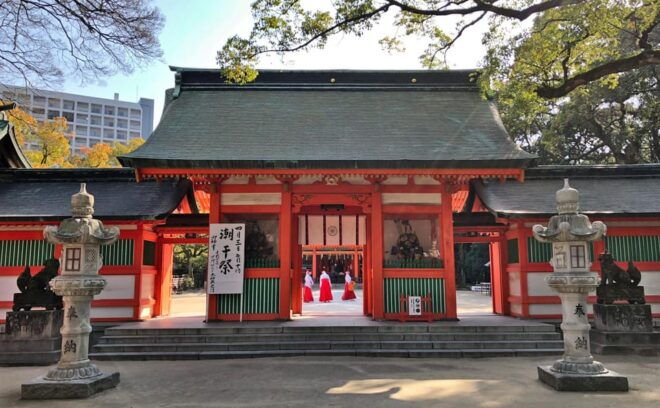
Stepping into Fukuoka is like opening a timeworn book filled with captivating tales and remarkable landmarks.
History enthusiasts find their haven in Shofukuji, the oldest Zen Buddhist temple in Kyushu, where tranquility reigns supreme. Nearby, Tochoji Temple boasts a stunning Buddha statue, inviting visitors to ponder its serene presence.
The heart of Fukuoka beats at Kushida Jinja, a shrine integral to the vibrant Hakata Gion Yamakasa festival. As you stroll through the Kawabata Shopping Arcade, local shops and food stalls offer a taste of tradition.
Lastly, Sumiyoshi Jinja‘s unique architecture and seaside connection provide a picturesque backdrop, enriching Fukuoka’s historical narrative. Each site tells a story, revealing the city’s deep-rooted heritage and cultural significance.
Local Festivals and Traditions
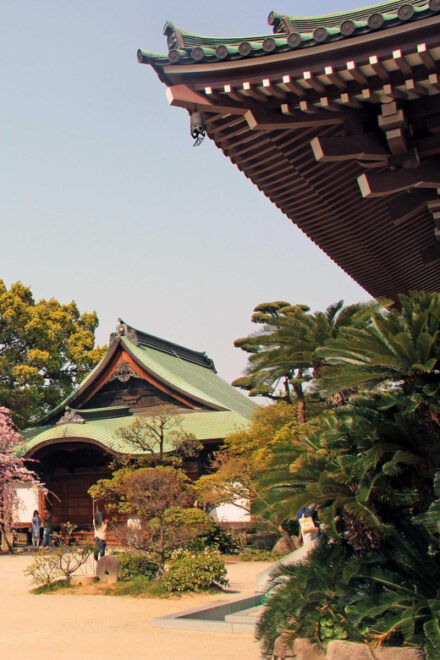
Celebrations pulse through the streets of Fukuoka, showcasing a vibrant tapestry of local festivals and traditions that bring the community together. The energy is infectious, as residents and visitors alike enjoy the spirited atmosphere.
Each festival embodies unique cultural elements that reflect Fukuoka’s rich heritage.
- Hakata Gion Yamakasa: A thrilling parade featuring elaborately decorated floats, racing through the streets.
- Hakata Dontaku: A lively celebration with music and dance, drawing thousands of participants in colorful attire.
- Chikuho Matsuri: A festival highlighting local crafts and performances, fostering community spirit.
These events not only celebrate tradition but also strengthen the bonds among the people, making Fukuoka a city where culture thrives and memories are created.
More Great Tours NearbyCulinary Delights in Fukuoka
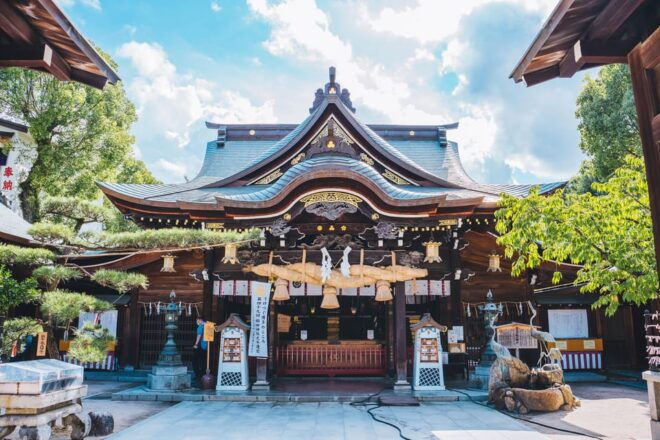
Fukuoka tantalizes the taste buds with its vibrant culinary scene, where street food stalls and cozy restaurants beckon with mouthwatering aromas.
Renowned for its tonkotsu ramen, the city serves bowls of rich, creamy broth that warms the soul. Visitors often find themselves indulging in yakitori, skewered grilled chicken, paired with a refreshing glass of local beer.
The bustling yatai, or food stalls, create a lively atmosphere, offering an array of delights like gyoza and mentaiko. Seafood lovers can’t resist fresh sashimi, straight from the nearby docks.
This gastronomic adventure invites everyone to savor the authentic flavors of Hakata, revealing Fukuoka’s unique culinary heritage one bite at a time. Each dish tells a story, connecting tradition with modern tastes.
- Fukuoka: Fukuoka Tower Observation Deck Admission Ticket
- Fukuoka Airport (Fuk):Private Transfer To/From Nagasaki City
- Fukuoka Cycling [Bike Is Life] Fukuoka “Hakata” Ride_Discover Kyushu
- Fukuoka: Japan/ Asia Esim Roaming Mobile Data Plan
- 1 Hour Private Photoshoot in Hakata
- Fukuoka:Hakata Temples, Shrines, Yatai Tour
Shopping and Entertainment Areas
In the heart of Fukuoka lies a vibrant tapestry of shopping and entertainment areas that beckon both locals and visitors.
The city pulsates with energy, offering an array of experiences that cater to all tastes. From bustling arcades to serene boutiques, Fukuoka’s shopping scene is as diverse as its culture.
Tenjin: A bustling district filled with department stores, trendy shops, and lively streets.
Canal City Hakata: A unique shopping complex featuring a canal, theaters, and dining options.
Kawabata Shopping Arcade: A charming, covered street where visitors can savor local delicacies and shop for souvenirs.
Fukuoka’s shopping experience thrives on this mix of modernity and tradition, making it an unforgettable aspect of the city’s charm.
Scenic Spots and Nature
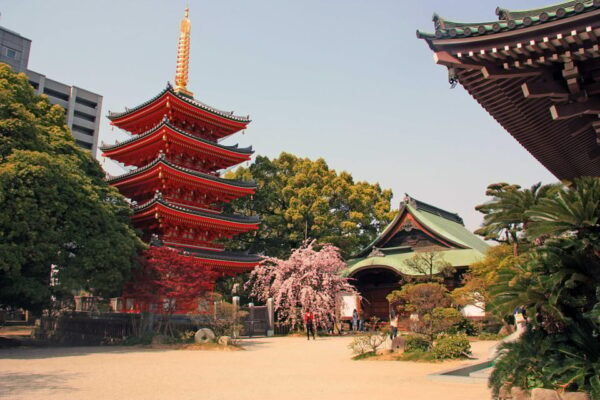
Nestled among the lush landscapes of Japan, Fukuoka boasts a stunning array of scenic spots that enchant nature lovers and casual strollers alike. From serene parks to picturesque coastlines, the city offers an inviting escape into nature’s beauty. Maizuru Park, with its historic castle ruins and cherry blossoms, provides a perfect picnic spot, while Ohori Park’s tranquil pond is ideal for leisurely walks. For those seeking a coastal view, Nishi Park showcases breathtaking sunsets over the ocean.
| Scenic Spot | Highlights | Best Time to Visit |
|---|---|---|
| Maizuru Park | Cherry blossoms, historic ruins | Spring |
| Ohori Park | Tranquil pond, walking paths | Year-round |
| Nishi Park | Coastal sunsets | Evening |
| Shikanoshima Island | Scenic beaches, cycling trails | Summer |
Tips for Exploring Fukuoka
Exploring Fukuoka offers an exciting blend of cultural experiences and vibrant city life, perfectly complemented by its stunning natural surroundings.
To make the most of this enchanting city, visitors should consider these tips:
Start early: Morning strolls through local markets provide a unique glimpse into daily life and fresh local cuisine.
Use public transportation: Fukuoka’s efficient subway and bus systems make it easy to navigate, ensuring visitors can reach attractions quickly and affordably.
Engage with locals: Chatting with residents can reveal hidden gems and authentic experiences, enriching one’s understanding of Fukuoka’s culture.
Frequently Asked Questions
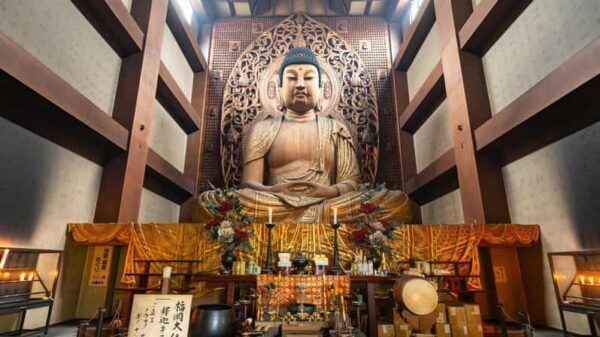
What Is the Best Time to Visit Fukuoka?
The best time to visit Fukuoka is during spring or autumn. Visitors enjoy mild weather, vibrant festivals, and stunning cherry blossoms, seeing the city’s lively atmosphere while experiencing its rich cultural offerings.
How Do I Navigate Public Transportation in Fukuoka?
To navigate Fukuoka’s public transportation, visitors should rely on its efficient subway and bus systems. Maps and apps simplify routes, while friendly locals often offer help, ensuring everyone finds their way with ease and confidence.
Are There Any Language Barriers in Fukuoka?
In Fukuoka, language barriers can exist, but many locals speak basic English. Tourists often find helpful signs and menus in English. A friendly attitude and gestures usually bridge any gaps, enhancing the overall experience.
What Are the Local Customs I Should Be Aware Of?
When visiting, she notices locals bowing as a sign of respect and taking off shoes before entering homes. Engaging in polite conversation and trying local cuisine enhances her experience, showcasing the warmth of Fukuoka’s culture.
Where Can I Find English-Speaking Guides in Fukuoka?
In Fukuoka, travelers can easily find English-speaking guides through local tour companies, hotels, or online platforms. These knowledgeable hosts provide personalized experiences, ensuring visitors connect deeply with the region’s rich culture and history.
The Sum Up
To sum it up, Fukuoka captivates with its rich tapestry of history, culture, and delightful charms. Visitors can enjoy ancient traditions, savor mouthwatering dishes, and explore historical landmarks that whisper tales of the past. The city’s vibrant festivals and bustling streets invite exploration, while serene parks offer moments of reflection. Fukuoka isn’t just a destination; it’s an experience that lingers in the heart, leaving travelers enchanted and eager to return.
You can check availability for your dates here: More Great Tours NearbyMore Historical Tours in Fukuoka
More Tour Reviews in Fukuoka
- From Fukuoka: 3-Hour Tour of Castle Ruins & Ohori Park
- Fukuoka: Private Nightlife and Hidden Gems Tour with a Local
- Fukuoka Nishinakasu: Japanese Sake Tasting with 3 Appetizers
- Fukuoka: Hakozaki Shrine, Tocho-ji Temple, & Ohori Park Tour
- Fukuoka: Itoshima Adventure & Wellness Private Day Trip
- Fukuoka: Nakasu Food Stall Private Guided Tour with Tastings
Looking for something different? Other Fukuoka activities we've written about
- From Fukuoka: 3-Hour Tour of Castle Ruins & Ohori Park
- Fukuoka: Private Nightlife and Hidden Gems Tour with a Local
- Fukuoka Nishinakasu: Japanese Sake Tasting with 3 Appetizers
- Fukuoka: Hakozaki Shrine, Tocho-ji Temple, & Ohori Park Tour
- Fukuoka: Itoshima Adventure & Wellness Private Day Trip
- Fukuoka: Nakasu Food Stall Private Guided Tour with Tastings
- Fukuoka: Munakata Taisha Shrine Guided Tour UNESCO Site
- Fukuoka: Marine World Uminonakamichi E-Tickets
- Fukuoka Shore Excursion:Sacred Island of Munakata & Heritage
- Fukuoka: Sushi Making Experience
- Fukuoka: Itoshima Waterfall, Ramen, and Fukuoka Tower Tour
- From Fukuoka: Kumamoto Castle and Mount Aso Day Trip
